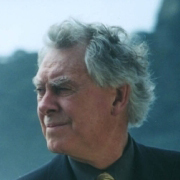
Bob Harvey
Sir Bob Harvey has made his mark in many areas — through six terms as mayor of Waitākere, work as a political strategist and president of the Labour Party, and a knighthood (given partly for his long involvement in surf lifesaving). His involvement in the New Zealand screen industry began early, and included three decades in advertising. Harvey co-founded prominent ad agency MacHarman Ayer, and company Daisy Films. Later he did time at the NZ Film Commission and spearheaded the creation of film studios in West Auckland.
Growing up in Auckland in the 1940s, Harvey was an avid cinema-goer. His first job was selling ice creams at Grey Lynn's Cameo Theatre at age 10. "I was utterly hooked on film,” he writes in his book White Cloud Silver Screen. "Even then I had a feeling that one day we in New Zealand could make our own movies." His "first real job" was as a gofer for film exhibition company Kerridge Odeon. He learnt how to be a projectionist, and by age 19, was managing a cinema in Rotorua. Then he moved into advertising at The NZ Herald.
In 1962, seeing a gap in the market for nimble and creative advertising, he founded MacHarman Advertising (later MacHarman Ayer), with Rex MacLeod. At the last minute, Harvey’s friend David Mansell decided not to join — his name is referenced in 'MacHarman' (‘Mac’ for McLeod, ‘Har’ for Harvey, ‘Man’ for Mansell’). The company quickly gained popularity as an alternative to the dominant Wellington agencies. MacHarman's creative reputation was helped by hiring talent like legendary adman Roy Meares, filmmaker Roger Donaldson and artist Dick Frizzell. "The client always came to Bob for the wild and wacky stuff," says Frizzell in Harvey’s biography Wild Westie. "He would totally hypnotise people ... he was an incredible presenter."
The agency’s work reflected Harvey’s political affiliations, including Labour Party campaigns 'Make Things Happen' and 'It’s Time' (after which MacHarman's business doubled within a year). Harvey can be seen discussing his first Labour campaign in this 1969 current affairs show. Over the years, he would play his part in image makeovers for Labour leaders Norman Kirk, David Lange and Helen Clark. Harvey cites the 1968 Save Manapouri campaign as a personal highlight. The company also got involved in pro-abortion and AIDS campaigns, and promoting the introduction of GST.
Harvey’s success in advertising — both creative and financial — gave him an opportunity to pursue another longtime fascination; filmmaking. In 1969 he joined MacHarman colleagues Warwick Brock and Ross Carpenter , to found production company Daisy Films — so-named because they first discussed the idea whilst lounging in the Auckland Domain on a sunny day, surrounded by daisies. Alongside their work at MacHarman, the Daisy trio released their first film in 1970: Keep On the Sunny Side, a half-hour documentary on the final National Banjo Pickers’ Convention. Harvey produced, whilst Brock wrote and directed. It was a strong start, with the film winning Best Documentary at that year's Feltex Television Awards.
Next Harvey produced Start Again, which explored the counterculture of the early 1970s. It was one of Roger Donaldson’s earliest film projects; he quickly became a Daisy Films mainstay. Later the two cooked up short-lived series The Adventure World of Sir Edmund Hillary, which followed Hillary and friends on wild excursions.
Harvey would also play a hand in Donaldson's first feature. Donaldson expressed interest in filming CK Stead novel Smith’s Dream. Harvey had already optioned it for $500 to make it into a movie. Smith's Dream would become Sleeping Dogs, a break-out success in Kiwi filmmaking (and the career of actor Sam Neill). Harvey also secured the film rights to two other projects, but they never came to fruition: groundbreaking 1970s TV drama Pukemanu, and classic novel Man Alone (which he offered to Gandhi director Richard Attenborough).
Alongside producing, Harvey has been a longtime fan and friend of Kiwi film – whether acting (he can be seen playing an advertising whizz in movie Skin Deep, four minutes into clip four), helping fund films (Donaldson's Geoff Perry), writing books about local film locations (2005's White Cloud Silver Screen), or simply lending his car (Film Exercise). From 1986 to 1992 he was Deputy Chair of the board of the NZ Film Commission, where he was proud "to be involved in commissioning movies like Whale Rider, Once Were Warriors" and more.
As mayor of the West Auckland suburb Waitākere (from 1992 to 2010), Harvey continued to support the screen industry and was instrumental in the birth of Henderson Valley Studios (aka Auckland Film Studios), one of the largest in New Zealand. The former fruit packing sheds had been used for Xena: Warrior Princess in the 1990s; in 2002 the Waitākere City Council began converting them into studios, which were utilised for everything from Whale Rider to the Narnia trilogy. In 2022 Auckland Council decided to sell them off.
Harvey has strongly championed New Zealand as a filming location for international productions, as well as encouraging the creation of a uniquely local cinema. In book White Cloud Silver Screen, he argues that New Zealand's "multitude of diverse scenic backdrops" has inspired painters, photographers and filmmakers. "It was the landscape that set the tone for our stories and our creative arts, and it underpins what we do and how we tell our cinema stories."
Profile published on 12 October 2022
Sources include
Bob Harvey
Bob Harvey, White Cloud Silver Screen (Auckland: Exisle Publishing, 2005)
Hazel Phillips, Wild Westie: The incredible life of Bob Harvey (Auckland: Penguin, 2014)
Kylie Munro, 'Harvey honoured' - The NZ Herald, 4 April 2007
Andrew Stone, 'Story of Bob Harvey: A life less ordinary' (Interview) - The NZ Herald, 26 July 2014
Wayne Thompson, 'Waitakere takes action on film studios' - The NZ Herald (date unknown)
Unknown writer, 'Bright lights to continue at Henderson’s iconic film studios' Eke Panuku Development Auckland website. Loaded 27 February 2020. Accessed 12 October 2022